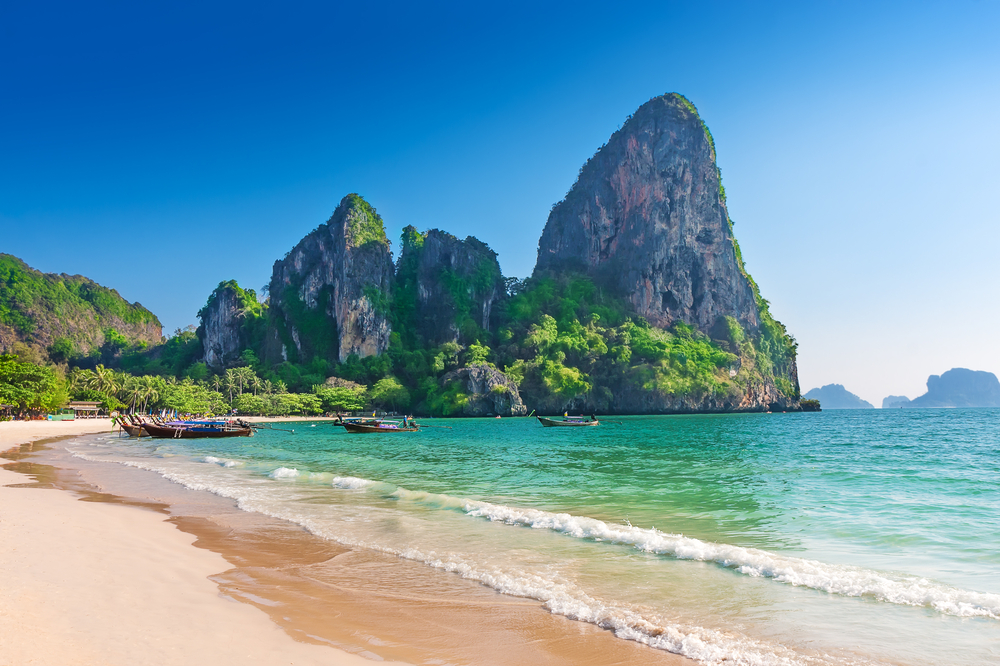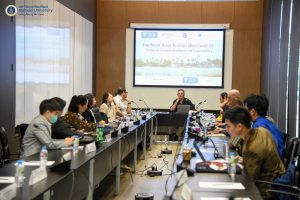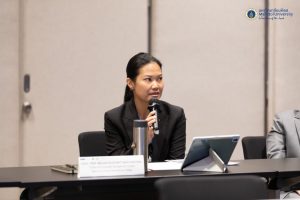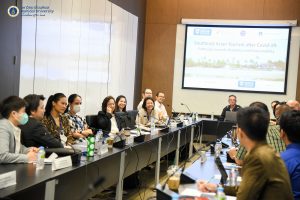
Could Southeast Asia’s enormous tourism industry be more sustainable and inclusive in a post-Covid era? Do countries in the region have to accept adverse environmental and social impacts from tourism because of its economic contribution?
Researchers from nine Association of South East Asian Nations (ASEAN) member countries, and representatives of regional tourism and environmental organisations and UN agencies grappled with these issues at a Bangkok policy roundtable “Southeast Asian Tourism after Covid-19: Pathways towards Resilience and Sustainability”, hosted by Mahidol University and co-funded by WUN. They proposed strategies and policies to transform tourism, making it better for people and ecosystems.
In his introductory remarks, co-organiser Andreas Neef, Professor in Development Studies at the University of Auckland emphasised that tourism is vital to the region’s economies. Before the COVID-19 pandemic – which devastated livelihoods and jobs – it supported more than 20% of total GDP and employment in Cambodia, the Philippines and Thailand. It’s important across ASEAN countries but unsustainable tourism has been a persistent problem. Overdependency on the tourism sector and the exploitation of natural resources and the environment are big concerns.

Photo courtesy of Mahidol University
Attendees from the Asian Ecotourism Network, the Pacific-Asia Travel Association, the Mekong Tourism Coordinating Office and the United Nations Development Programme heard reports from Brunei Darussalam, Cambodia, Indonesia, Lao PDR, Malaysia, Myanmar, Philippines, Singapore, Thailand and Vietnam about the pandemic’s impact on tourism and societies. New Zealand’s Ministry of Foreign Affairs and Trade had commissioned nine country reports and nine policy briefs within a two-year project led by researchers at the University of Auckland, which also examined the countries’ pandemic response measures and long-term recovery strategies.
Dr. Walanchalee Wattanacharoensil of Mahidol University said, “It was a fruitful workshop with insights about both common and distinct issues for countries across the region. International collaboration gives a unique opportunity to learn from one another and embrace new ideas for sustainable tourism management and development.”

Photo courtesy of Mahidol University
The research team had synthesised findings from each country to make six policy recommendations towards a more sustainable, resilient and just tourism economy across the region:
- diversifying tourism products and greening the tourism economy
- enhancing the digital transformation of the tourism sector
- strengthening regional cooperation and participatory multi-stakeholder mechanisms
- refocusing government support to Micro, Small & Medium Enterprises (MSMEs)
- retaining, retraining and upskilling formal and informal tourism workers
- strengthening the sector’s resilience through effective crisis management strategies
“Tourism income is crucial: many ASEAN member states are developing countries,” added Walanchalee Wattanacharoensil. “We need tourism to be strong, resilient, inclusive and sustainable. Everyone knows the importance of mitigating the industry’s impact on the environment and we must diversify tourism within countries and the region. If some of the region’s countries can attract higher-quality visitors[1] they could generate the same value to jobs and livelihoods but with less tourists and reduce the burden on national resources and tourism environments.”
Now tourism is “bouncing back,” added Associate Professor Jamie Gillen from Global Studies at the University of Auckland, but “an age-old conversation is growth versus protection and sustainability. We are in the perfect moment to rethink tourism and sustainability – what priorities and boundaries should we set?”

Photo courtesy of Mahidol University
What next?
- Sign up to the WUN newsletter to get the latest stories about our members’ research, three times per year.
- Click here for a video summary of this project.
- Download individual country reports and condensed policy briefs. Each features case studies covering major tourist destinations in the region:
- Research on Myanmar was not possible due to the military coup in February 2021 and the continued state violence and civil unrest in the country. WUN funding enabled participation at the roundtable by colleagues from Mahidol University including the involvement of a Burmese Masters student. This researcher was able to make a meaningful contribution to the workshop, covering policies to best support the country.
- Read the synthesis report, COVID-19 AND THE TOURISM SECTOR IN SELECTED ASEAN COUNTRIES – Impacts, Responses and Roads to Recovery, which also covered five long-term adaptive strategies to address pre-COVID concerns and build a more sustainable and resilient tourism sector.
- Researchers are collaborating on an edited book and a co-authored journal article due for publication in 2024.
[1] The term “high-quality tourists” encompasses both higher-spending and more responsible tourists.